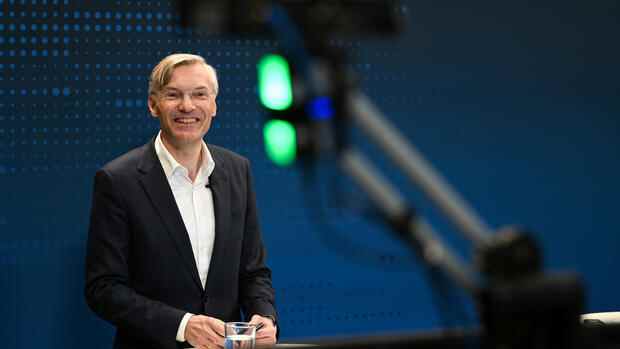The CEO presents the figures.
(Photo: picture alliance/dpa)
Stuttgart The second largest German automotive supplier, ZF, is growing despite declining production figures from car manufacturers. In the first half of the year, the turnover of the foundation group from Lake Constance increased by ten percent to 21.2 (2021: 19.3) billion euros. According to management, less than half of the increase in sales can be attributed to rampant inflation.
However, returns came under pressure as material and transport costs rose sharply. Adjusted earnings before interest and taxes (EBIT) fell by 15 percent to EUR 851 million. The EBIT margin is reduced from 5.2 to now four percent.
That’s good compared to the third largest German auto parts supplier Continental. The Hanover-based company made losses in its core automotive business for car components, sensors and software in the second quarter.
Production interruptions in China due to strict lockdowns, rising raw material and logistics costs and the Russian war of aggression in Ukraine are causing problems for the automotive industry as a whole. Global car production fell by two percent in the first six months, and commercial vehicles by more than a quarter.
Top jobs of the day
Find the best jobs now and
be notified by email.
“The first half of the year was characterized by many imponderables and external influences, which we have mastered well – also based on the crisis experiences of the past two years,” said ZF CEO Wolf-Henning Scheider when presenting the half-year figures. After only five years as CEO, Scheider is leaving the company at the end of the year and making room for his successor, Holger Klein.
Scheider wants to expand business with power electronics
ZF reports significant progress with the order volume for electric drives for passenger cars and commercial vehicles with 23 billion euros by 2030. All automotive suppliers are trying to achieve high volumes here in order to be able to continue employing many employees from the declining combustion technology in the transformation phase.
>> Read here: New boss for Germany’s second largest automotive supplier: Holger Klein takes over
ZF even seems to be able to overcompensate: “With the new orders, we can manage the change from classic transmissions to purely electric drives and more than compensate for the loss of technologies for vehicles with combustion engines,” said Scheider. Scheider also wants to expand the business with power electronics for electric cars and central on-board computers. There is already a major order from an international customer.
ZF records record sales in the electrics segment.
(Photo: imago images/kolbert-press)
“Even if the challenges don’t get any smaller in the second half of the year, we are confident,” said ZF CFO Konstantin Sauer at his last public appearance before retiring. The search for a successor is currently underway. The duration of the search is more indicative of an external candidate.
ZF was still indebted by around ten billion euros from the major takeovers of TRW and most recently Wabco. The main task of the new CFO will be to continue to manage this when interest rates rise and not to downgrade the rating.
Prognosis subject to change: ZF continues to anticipate negative influences
After all, the group has further strengthened its equity base in the first half of the year and increased the equity ratio from 18.6 percent to around 24 percent as of June 30, 2022. In addition, Sauer was able to increase an existing and previously unused revolving credit line (RCF) from three to 3.5 billion euros. Sauer emphasized that ZF has thus secured attractive financing conditions that can be planned over the long term a year before the due date.
CEO Scheider confirmed the previous forecast for 2022 with moderate growth in group sales to more than 40 billion euros for the first time. ZF expects the adjusted EBIT margin to be in the range of 4.5 to 5.5 percent, the adjusted free cash flow between 1.0 billion and 1.5 billion euros.
The forecast remains conditional, as ZF expects the known issues (inflation, war in Ukraine, limited availability of semiconductors, renewed waves of the Covid-19 pandemic) to continue to have a negative impact. In addition, Scheider fears burdens from possible gas supply stops in Germany and Europe in the second half of the year. However, the company is preparing for this scenario.
More: New boss for Germany’s second largest automotive supplier: Holger Klein takes over
